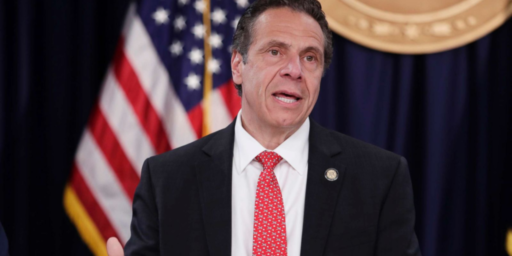Performative Leadership
The downfall of Andrew Cuomo shines a light on toxic workplaces and governance styles.

Since leaving Vox and moving to the New York Times, Ezra Klein has been hosting an eponymous podcast* doing interviews with various figures. Given the plethora of shows to which I subscribe, I tend to listen only when there’s a guest or topic that piques my interest. One that was much more interesting than I would have guessed was the March 19 episode, “Andrew Cuomo and the Performance of Power,” which I listened to on my commute yesterday, along with March 23rd’s “An Unusually Optimistic Conversation With Bernie Sanders.”
While I expected the Sanders episode to be more interesting, mostly because I care more about national politics than those of New York State, I was intrigued by the last bit of the episode description: “Rebecca Traister and Ezra Klein discuss the New York governor’s fall from grace, toxic workplaces and the aesthetic of strongmen leaders.”
The fall from grace piece was more compelling than I thought because of the juxtaposition of Cuomo and former President Donald Trump. Despite what turned out to be absolutely horrible leadership of the COVID crisis in his state, Cuomo was lauded as a shining light—even getting a major book deal during the crisis—and cast as the opposite of Trump. When, in many ways, he was the same guy: a bully whose style for awhile masked his incompetence.
But Traister’s argument is that this is a familiar tale.
I was sitting in New York in Brooklyn in the midst of that, furious that he was getting that level of honor. But it was very familiar to me because I also lived in New York when Rudy Giuliani was the mayor after 9/11. And many of my liberal peers at that time, people who for years had understood Giuliani as a brutal right wing fascist, suddenly were like oh, but he’s really comforting in this time after crisis. People who had spent their adulthood despising this guy suddenly were like oh, but I’m so glad Giuliani is mayor. And I admit, I was perplexed about that at the time. I was 26 years old. And I was like what? What? Giuliani? But I remember that reflex. I thought about it constantly during the spring of 2020, as people were calling him the Love Gov. Again many, of my peers who had been critical of Cuomo from the left suddenly were like oh, but he is doing a really great job. And I saw what you were seeing. I saw, in fact, symptomatic of exactly this kind of power playing approach to politics. That conflicts with de Blasio, I wrote what is — it wasn’t at all a reported piece. It was a column, an opinion column about the toll of that, what I call the dick swinging contest between Cuomo and de Blasio. And that was before there was the report that found that 17,000 lives were probably cost by those back and forth delays. But it was this posturing around who had more authority. And it happened around the closing of restaurants. It happened around the closing and opening of schools. And it was symptomatic of Cuomo’s inability to surrender even the slightest amount of his grip on the performance of ultimate authority and power. He couldn’t let anybody else, including the mayor of New York City, have a say in governance decisions around that city. What was that power for? Because it was, actually, costing lives. It was about publicly establishing your might. And that was the priority, well over trying to make policy decisions, trying to make rules, trying to govern through one of the great crises of the century. And it was so evident. But we have for so long, over centuries, through generations been taught, all of us it’s — been inculcated in us — to confuse especially in white male politicians and political leaders a kind of brutal grip on power, an assertion of ultimate authority with actual effective governance or leadership or passion or commitment. We are taught to confuse brutality with leadership.
Which gets to the “performance” piece.
The public performance of him as governor was the primary thing and then you filled in everything else behind that. I mean, Cuomo is, in many ways, a Democratic analog to Trump. The focus on getting in front of people’s eyeballs and asserting yourself as a leader, which, of course, is a kind of performance, you make it true by asserting that it’s true in front of as many people as you can get in front of. But it is, it is a performance of a traditionalized white masculinity and a performance of a kind of assertion of brutal dominance — dominance is the key word here — that is meant to inspire fear and discourage challenge. And the broader the audience you can reach with that, the more you can spread and disseminate this view of yourself as dominant and discourage anyone who would critique you from launching that critique.
She goes on at length about the degree to which bullying behavior was integral to Cuomo’s style and how it filtered down to his staff. When the report came out demonstrating that his decision to force nursing homes to take people released from hospitals while recovering from COVID objectively killed huge numbers of New Yorkers, Cuomo’s instinct wasn’t humility but to attack in a rather vile manner.
Cuomo and his top aides — and this is something I discovered in my reporting — have for years used open threats and intimidation and language you can’t believe toward anybody who’s criticized him. I want to give some examples that precede the nursing homes report, just to show that this wasn’t some spasm of cruelty, but rather that this is habit of his administration. It’s part of their approach to governing itself. Several years ago, after the election of a group of young progressive lawmakers to the legislature that actually rid the legislature of a group of conservative Democrats known as the IDC, the Independent Democratic Conference, that had held the legislature later out of actual progressive Democratic hands for years, some of these young legislators were very open in their criticism of Andrew Cuomo. And one of his top aides, Rich Azzopardi, said to The New York Times, he called them fucking idiots. Members of the governor’s own party — these are young Democrats, three young female lawmakers, who the governor’s, one of his top communicative aides, Rich Azzopardi, referred to as fucking idiots in The New York Times. That’s bananas. And there was no retraction. There was no oh, I’m so sorry. No, that was the message of the administration. I mean there, are a million examples of this. The text messages between Melissa DeRosa and Alessandra Biaggi — by the way one, of the young lawmakers who was called a fucking idiot by Rich Azzopardi — in response to criticism that Biaggi leveled against the Cuomo administration about its handling of Covid, Melissa DeRosa texts her privately, saying “you’re both full of shit and a pretty terrible person. Given what a big mouth you have, I’m shocked that you knew the virus was coming from Europe and didn’t say anything.” Biaggi responds fairly professionally. And DeRosa texts back to her, “you are a bad person and you are full of shit. The fact is you are a revisionist liar and it’s disgusting. And sadly, I’m not surprised. It’s who you are.” That is the direct message being sent by the governor’s top appointed aide to a young legislator who is a member of the governor’s party. It is entirely unprofessional. It is entirely outside any professional bounds. And yet this is the way that members of the Cuomo administration were taught to treat people. And in my piece, I talked to many people who worked within the administration who told me that they were actively encouraged to develop this communicative style, that it was not only OK, but that you were encouraged to berate people who challenged you.
To which Klein responds,
I remember back to the Obama administration — and this feels like a million years ago — but Andrew Cuomo was talked about as a potential 2016 presidential candidate. I remember people trying to sell me on his candidacy. And one of the arguments they always made was that Andrew Cuomo, he knows politics is a hard game. And he knows how to get things done. He doesn’t sit back, isn’t overly genteel, doesn’t allow people to walk all over him. He gets the hard knuckle dimension of politics and so he can get things done that another Democrat could not. And it was all based on this reputation, this idea that it was actually — this approach to politics was effective. Does the overall sweep of the Cuomo administration suggest it was? Did they get much more done than, say, other Democratic governors in similar situations, such that you might say, well, look, that reads badly when you say it on a podcast, but at least all these people got tremendously helped in ways they wouldn’t otherwise because of how aggressive the governor and his aides were.
Traister argues the opposite is true. That Cuomo is really bad at governing because he makes poor choices and is more interested in being seen as powerful than in actually getting policies enacted.
So he could run as a progressive. And because he did convey this air of authority and competence, people who liked him could tell you “oh, but he gets things done.” What dozens of people who worked for him, including those who are focused specifically on developing policy, told me was that he just wasn’t invested in particular policy measures. He was invested in public events, where he would go and perform authority. And he often, as many people told me, would fill in policy, as one person who worked for him on policy told me, that it would be like OK, I want to go to Orange County. What policy can we introduce there? So the question of — he certainly amassed the power. But I do think this is a broader question. What is the point of having power? I think that’s a real question that has long historic reverberations and is very much in play as we move forward politically. What is the use of power?
She goes into some rather ugly detail about the toxic workplace culture Cuomo fomented and draws analogs with Trump, noting that he, too, encouraged aides and sycophants to enact performances of rage on television. She recounts incidents from early in her career with Harvey Weinstein, who was similarly abusive in an absurdly over-the-top way.
Klein points to the case of Steve Jobs, who was almost as famous for his ill treatment of coworkers as for his genius and muses, “I wonder if we’ve just been convinced in a bunch of these different cases — which are distinct, but nevertheless have some of this in common — that certain kinds of cruelty are just the cost of great leadership.”
To which Traister responds with what I think is her most interesting insight:
I think this is one of the costs of a long history of having understood white men as fully human in a way that we don’t understand other people as being fully human. We have been able to imaginatively integrate when it comes to white men their weaknesses, their faults, their failings, their cruelty as part of their complex humanity, because white men have been presented to us in our literature and in our culture and through the ways that we’ve configured family and politics and law, white men have been presented to us as fully human, containing contradiction and complexity. And so we can integrate what we understand to be the cruelties of white men right alongside what we also have been led to understand as their genius, their talents. White men can be simultaneously malevolent and sympathetic to us. So often, conversations are like oh, but I can’t help but feel for him. Right, I experienced this, too. And so I think that’s crucial to understanding how we have come to be able to rationalize cruelty and harm done by powerful people, to rationalize that cruelty and harm as linked somehow to whatever talents we’ve also celebrated in them, or in some cases imagined them to have. And I don’t think that that same combination is typical in many other kinds of leaders, whether in business or in politics. Often, if you get women or people of color who behaved with this degree of cruelty not in service of — it’s not like women in the Trump administration doing it in service of Trump or women in the Cuomo administration doing it in service of Cuomo or women in Harvey’s company doing it in service of Harvey, I think when you get women and people of color enacting harm and being cruel, you don’t often get to the part about oh, but they’re really geniuses.
This leads to a conversation about Amy Klobuchar and Hillary Clinton that’s mildly interesting but retreads familiar ground. But Klein makes a really insightful observation:
And one of the takeaways I really came out from that piece with is that we have just been taught to look for leadership in a kind of confident public communication style. And then all these other ways that, both in the literature and then just in reality, female leaders, but also just good leaders have to lead, which is coalition building and making people feel heard and listening to critics, and all these things that have to happen behind the scenes and are really, really important for getting things done, they’re just completely undervalued in the way we pick and then the way we assess leaders, and that it has a systemic overall deteriorating effect on our governance. One of the odd things right now is Joe Biden had this whole career where he was just like the most stereotypically male political figures, endlessly confidently talking about stuff that he often didn’t know that much about it in public. Then he’s gotten older. His real talents have emerged to be coalitional, at making people feel listened to, at being able to find the center of his party and hold people together. And it’s leading to a much more successful presidency than I think the Joe Biden of 2008 would have had. But I don’t know how well we’re learning the lessons of that.
In both the 2016 Republican primaries and the 2020 Democratic primaries, a lot of very successful governors presented themselves as candidates but none got any traction. We’re increasingly choosing candidates based on how they perform on television, whether in stump speeches or “debates, even though that has very little to do with the job of President.
Jay Inslee has objectively done a far, far better job of managing COVID in Washington than Cuomo did in New York. But he didn’t get a book deal. And nobody took his run for President seriously, because competence and experience alone don’t sell.
Traister closes this part of the show with her hopes for what this story to shape the public conciousness.
[W]e go through years, decades, centuries in which these behaviors are out in the open and they’re normalized and that part of the power is that the people who engage in them get impunity. They can do it without repercussion, because even when they’re out in the open, nobody — the lens isn’t critical enough that it complicates their grip on the public’s approval and imagination. And then you get these windows where something changes, right, and where suddenly these behaviors look as bad as they are. And I want that window to stay open with Cuomo. And I know from experience that it doesn’t always stay open, right, because it’s uncomfortable and it drives us to ask hard questions about ourselves and what behaviors we’ve learned to tolerate and what forms of discrimination we’ve normalized in our own heads. And so having these periods where we look hard and critically at some of the things that we all have just permitted to exist and perhaps even found ourselves being lulled into liking, we go through these periods where suddenly we question the fact that we’ve done that. And it’s really uncomfortable. And it’s really hard. And it forces us to think about, like god, what do we have to do to actually make our governance better and to challenge ourselves and our own standards for governance and behavior? I’m so it’s very discomfiting. And so there is a temptation to close them and just go back to an easy — an easier view of the world in which oh, that guy who talks tough on television is going to steer us through with competence. It’s much more uncomfortable to fear that maybe that guy on television doesn’t know what he’s doing and is steering us in the absolute wrong direction.
Biden is arguably the first President since George H.W. Bush to come into office truly prepared for the job. And, while I have thought many times that I would prefer a 20-year-younger Biden to the over-the-hill one we have, Klein may well be right that the mellower version we have now is a better leader.
While I have tended to roll my eyes at the notion that our society treats white men as “fully human,” Traister’s formulation is compelling. It’s not so much that we see women or non-whites as lesser but that we view them through different lenses. Because white men have so dominated the positions of authority—not only in real life but in literature and cinema—we have come to allow a much wider range of acceptable styles. Women and people of color have to fit into a more perfect box.
The twist, though, is that Traister isn’t arguing that, since Trump, Cuomo, Giuliani, Weinstein, and Jobs were allowed to get away with being awful we should cut Amy Klobuchar some slack. Rather, she’s calling for us to make that sort of toxicity unacceptable across the board.
*Note: This post began as a Podcast Recommendation but the existence of a show transcript turned it into a much longer discussion.






Nice post James, thanx.
Construction is full of alpha males trying to out alpha all the other alpha males on a job site. It gets tiresome and while my general reaction to it was “Yeah, sure… You go on about your bad self” and let them continue to pretend while otherwise ignoring them, I did lose my temper on a few occasions.
As such, I’ve never been impressed by such d*ck swinging. It’s just a mask covering up their inadequacies.
Surprisingly good piece though I think that the “fully human” thing kind of detracts from it. I have had long term interests in leadership issues having been a military officer, ran a medical group for many years and now chair a medical department. Leadership on a smaller scale but the skills, I think, largely apply elsewhere. This image of the overpowering alpha male, leading by intimidation and cruelty is toxic. Does it ever work? Yes, sometimes and someplaces but by and large it fails. There is a body of literature on this so it has been studied but do we really need some study to verify what we know? People who have marketable skills and are able to leave usually wont tolerate working for some jerk.
You do need competence. Vision, people skills, the ability to make hard decisions (including dealing with conflict) and lots of other things make ups good leader. There is a performative component like it or not. Being an assh*le doesnt guarantee one will have those qualities and probably makes it less likely.
I dont follow NY politics that closely so was unaware of most of this. Glad we found out before he ran for POTUS or any other office.
Steve
I recognize we all have blind spots and by definition we can’t see our own. With that caveat, I’ve never understood the attraction to the Andrew Cuomo/Rudy Giuliani/Donald Trump/Chris Christie types. To me they immediately scream “Trouble!” I am just astounded that anyone sees these clowns and think “competence”.
The qualities that lead to Alpha don’t in any way translate to “good analysis and planning”
@steve:
Like a lot of vocabulary used in these discussions (“priviledge” comes immediately to mind) it’s helpful as insider jargon but unhelpful in convincing outsiders. That formulation has turned me off in the past but I think her mention of literature (I’ve added movies and television shows) made me understand what she was driving at:
It’s not that we see white women or non-white men as less than equal human beings, although some certainly do, but that we allow for more complexity when trying to understand a given white man vs a given woman or non-white man. And that’s because we intuitively think of white men as the default “politician,” “Senator,” or “President.” Women and people of color simultaneously have to conform to the expectations created by white men but are allowed less deviation from the ideal examples.
I don’t have, and have never had, any patience for men like this.
One of the best things about the writing life (sub-category books) is that I am not part of anyone’s hierarchy. Swing your dick all you like, I DGAF because I don’t have to give a fuck. I’ve been edging into Hollywood writing as opposed to New York writing (NY being shorthand for book publishing) but have put the brakes on that because I failed to appreciate how much it would force me into a hierarchy. As part of conversations to do with rights (as opposed to performing work) I’ve started to get a clearer picture, which crystallized in a conversation with a producer in which it was made clear that a Hollywood ‘note’ is an order, where a New York ‘note’ is a suggestion.
I am very open to persuasion, helpless in the face of a well-reasoned argument. But play some stupid dominance game and I walk. (As we did recently on the Animorphs movie.) I would listen to Joe Biden. I might not think he’s a genius, but I’d listen, and be open to persuasion. Trump? I’d walk after ten seconds. I believe I may have mentioned on, oh, one or two occasions, how much I despise the people weak enough to have tolerated Trump’s bullying. Cuomo is apparently the same guy.
I understand people have to feed their families. That’s an excuse for working for a Cuomo type until you can get the hell out. But only until you can get the hell out. My sympathy for the abused Cuomo staffers drops precipitously the longer they put up with it. Have some pride. Have some dignity. Life’s too short to spend it being bullied.
@Michael Reynolds:
Like you, I have no appetite for this and no ability to put up with it. I’m a bit more sympathetic, though, to the staffers.
The bottom line is that, if you want a career in New York politics, Cuomo is the only game in town. That’s especially true if you’re an ambitious Democrat.
While I wouldn’t have done it, I understood people who went to work in the Trump administration, at least early on. An ambitious Republican Assistant Secretary or high-level staffer aspirant would already have been shut out for the eight years of Obama. Refusing to work for Trump extends that a minimum of eight more years (he’s either going to get reelected or replaced by a Democrat) and likely ends your career in politics.
Again, I don’t have the ability to put up with the bullshit. But I kinda get why people do it.
Yep. Being a union carpenter gave me an advantage non-union folk don’t have (tho bad times certainly scrambled the math) but I can’t count the jobs I walked off of because I wouldn’t put up with screaming or other types of bullsh*t.
“I was looking for a job when I found this one.”
@OzarkHillbilly:..“I was looking for a job when I found this one.”
When I was working in Monroe City, Missouri (a good five hour drive so I only made it home on weekends) as a contractor for the Continental Telephone Company my immediate supervisor, Del Buckman, a company man, for a some reason I don’t remember* threatend to run me off the job.
“You want to do me a favor?” I said. “Send me home. I’d much rather be laying on the couch looking at the ceiling than slopping around in this Missouri mud out here.”
I knew he didn’t have the authority to fire me and when I called his bluff he looked like a deer in headlights.
It pissed him off too. Later that day when I called into the telephone building I heard him in the background steaming about “…he doesn’t even want to be here!”
*Most likely he said “jump” and I did not respond “how high?”
@James Joyner:
Not just in politics. Or maybe just because so many politicians are recovering lawyers. I’ve spent the better(?) part of 30 years in the wonderful world of law in support positions. Receptionist, legal secretary, paralegal, office manager, litigation manager, IT. I spent over a decade working as a freelance/contractor, mostly so I didn’t have to put up with the screamers and power trippers. Law/medical schools seem to exacerbate the base personality. I was referred to as a “smoke jumper.” My mission was to jump into a situation that was a dumpster fire, fix everything, and ride the f*** out of Dodge. I have limited sympathy for the political wannas looking for careers in politics. I have absolute sympathy for the unmentioned herd of receptionists, secretaries, valets, drivers, maids, cooks, and everyone else who has to put up with this kind of crap in order to feed their families. Been there, done that, got the hat and souvenir beer cozy.
Forgive me, but Steve Jobs is one of my buttons: did he have any actual genius for anything other than taking the credit for other people’s work?